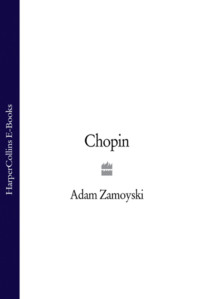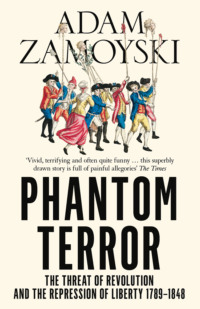
Полная версия
1812: Napoleon’s Fatal March on Moscow
An altogether more serious response came in the Tyrol, where resentment of the French ran much deeper. The area had traditionally been governed by the Habsburgs with much respect for local tradition and idiosyncrasies, but Bavaria, to which it was transferred by Napoleon in 1806, operated a more centralised administration. The locals were offended by higher rates of taxation and by enforced conscription. The parish clergy did not approve of the secularisation taking place in Bavaria, adding to the discontent. In January 1809 Andreas Hofer and a handful of other Tyrolese went to Vienna to prepare an insurrection to coincide with Austria’s invasion of Bavaria. On 9 April beacons were duly lit and the Tyrol rebelled. A Bavarian corps of two thousand men was forced to capitulate, and Austrian forces occupied Innsbrück. But they were soon ejected from it by the French under Marshal Lefèbvre.
On 21–22 May Napoleon fought the twin battles of Aspern-Essling against the Austrians under Archduke Charles. Although technically a French victory, they reverberated through Europe as a defeat. Napoleon suffered a personal loss in the death of Marshal Lannes, and had to bring Lefèbvre back to join the main army. This allowed the revolt in the Tyrol to erupt with renewed vigour, under the slogan ‘God and the Emperor’, which had enemies of Napoleon all over Europe rubbing their hands at what they thought was a new Spain.
At this point, the Duke of Brunswick-Oels appeared on the scene. His father had been ignominiously defeated at Auerstädt in 1806, and he had vowed eternal hatred to the French. He had gone to Vienna, where he obtained a subsidy in order to raise a 20,000-strong ‘Legion of Vengeance’ with which he intended to liberate northern Germany. He now sallied forth, defeated the Saxons at Zittau, seized Dresden on 11 June and Leipzig ten days after that. On 21 July he marched on, through Brunswick and Hanover, but he met with little enthusiasm, and was eventually forced to take refuge on a British man-of-war in the Baltic.
In the meantime, Napoleon had won the conclusive battle of Wagram, and Austria was forced to sign the Treaty of Vienna, which reduced it to a state of powerlessness. Her image as a potential liberator of Germany was shattered, and she settled down meekly within the Napoleonic system. Francis was only too happy to pay tribute by giving his favourite daughter to the Corsican ogre, and the marriage was hailed as a happy event by his people.
Austria’s failure stemmed in large measure from her inability to engage the support of Russia, and above all to draw Prussia into the war against the French. The pan-German plotters had been active in this respect, and Vienna had been in close touch with Stein, Hardenberg, Scharnhorst and the other Prussian reformers, who were doing everything to bounce Frederick William into declaring war. But the pusillanimous Prussian King was afraid. He was afraid of the French, and he was afraid of starting a ‘national’ war that might end up by costing him his own throne. It was only when, with Schill marching into Westphalia and popular opinion at a high pitch of excitement, he thought he might lose his throne if did not act that he considered going to war.
One of the stipulations of the Treaty of Vienna was that Francis had to banish all French émigrés, Piedmontese, and Germans from other states who had settled or taken service in Austria. A number, including Karl von Grolmann, a Prussian officer who had come to fight for Austria, now headed for Spain, where they could carry on their crusade against Napoleonic France. Many more took the St Petersburg road, already trodden by some of those German patriots who had gone to Prussia in the hope that she might become the champion of Germany. With both Prussia and Austria discredited, Alexander was beginning to look like the only alternative. He was still an ally of Napoleon, and had acted as such by sending an army to threaten Austria during the recent war. But he had done only the minimum demanded of him. Assisted by large doses of wishful thinking, many of those opposed to Napoleon and French hegemony had begun to see in Alexander a tutelary angel of their own particular cause.
One of the first to fall for Alexander, when she had met him in 1805, was Frederick William’s Queen, Louise, who saw him as ‘a Schiller hero come down to earth’. ‘In you, perfection is incarnate,’ she wrote to him; ‘one must know you to know perfection.’ The feeling did not go unrequited, which was probably what had saved Prussia from extinction at Tilsit. But there was little more that Alexander could do for her and her dismal husband. In January 1809 he invited them to St Petersburg, where he honoured and fêted them, thereby sending out a strong signal to all Napoleon’s enemies in Europe. The mutual esteem between Alexander and Louise grew. When he heard of her death in Prussia in July 1810, he saw her as a victim of Napoleon’s barbaric oppression and reacted with requisite chivalry. ‘I swear to you that I shall avenge her death and shall make certain that her murderer pays for his crime,’ he is alleged to have said to the Prussian Minister in St Petersburg.11
Alexander was also viewed as a potential saviour by other humiliated or dispossessed monarchs and nobles, including the kings of France, Sardinia, the Two Sicilies, Spain, the Grand Master of the Order of Malta, a gaggle of dispossessed Germans, as well as hordes of French, Piedmontese, Spanish and other émigrés.
This did not prevent elements more or less violently opposed to the ancien régime from looking to him as well. Many of the Germans who placed their hopes in Alexander were republican or at least liberal nationalists in conflict with the Prussian monarchy. The same went for Tugendbunders and even the Freemasons, who were regarded by Frederick William as dangerous subversives. Among the Spaniards and Italians who placed their hopes in the Tsar were liberals who would in time be clamped in irons by their own monarchs.
Other unlikely members of the club were French liberal opponents of Napoleon, such as Benjamin Constant and Madame de Staël, who, while subscribing to most of the achievements of the French Revolution, hated him for his despotic tendencies and for the cultural arrogance with which he treated Europe. Her bestselling novel Corinne, published in 1807, was a thinly veiled criticism of French doings in Italy, while her treatise on German literature, De l’Allemagne, was so implicitly critical that the first printing was confiscated on Napoleon’s orders.
His behaviour and his policies were rapidly losing Napoleon the dominion over hearts and minds he had enjoyed in earlier years, while a great internationale of alienated people all over Europe was gathering, bound together only by their detestation of him. Even Wellington was beginning to see and to portray his war against Napoleon in Spain as a part of some kind of moral crusade.12
None of this was of any immediate consequence, and Napoleon’s position in Europe was still paramount. He controlled his vast imperium through a web of loyalty, beginning with his crowned brothers. He had created all over Europe a new international aristocracy beholden to him, endowed with fiefs which had fallen vacant through the mediatisation of the Holy Roman Empire or through conquest, and by 1812 the imperial almanac listed four princes, thirty dukes, nearly four hundred counts and over a thousand barons, not including the titles Napoleon had given to members of his own family.
It is also worth noting that he had many natural allies bound to him by self-interest of one sort or another. Frederick William and Hardenberg feared the social upheaval that might result from any national revival more than they resented Napoleon. Others in Germany and Europe as a whole feared the relentless onward march of Russian expansion and believed that a weakening of French influence would entail Russian hegemony, and distrusted Alexander’s motives.13
Napoleon’s spies nevertheless kept a close watch on potential subversives all over Germany and on the support they were receiving from Russia. By the summer of 1810 he was growing irritated by the numbers of Russians visiting European courts and capitals trying to incite people against France. In Vienna, the former ambassador Count Razumovsky, the salonière Princess Bagration and Napoleon’s old Corsican enemy Pozzo di Borgo, now in Russian uniform, made up a real propaganda network between them. Others were rallying anti-Napoleonic sentiment in the watering places of Germany. He asked Alexander to recall them all to Russia, but received scant satisfaction.
In November 1810 Talleyrand’s successor as Foreign Minister, Jean-Baptiste de Champagny, reported to Napoleon that ‘a vast revolution’ was brewing in Germany, fuelled by national hatred of France. This gathered in strength as tension between France and Russia mounted, and as the Continental System began to bite. Although he tended to make light of the threat, Napoleon was beginning to take more serious note of it, and declared his intention of ‘uprooting the German national spirit’. And the only way he would be able to ‘uproot’ this burgeoning growth was by cutting off its chief source of nourishment, which came from Russia.14
Конец ознакомительного фрагмента.
Текст предоставлен ООО «ЛитРес».
Прочитайте эту книгу целиком, купив полную легальную версию на ЛитРес.
Безопасно оплатить книгу можно банковской картой Visa, MasterCard, Maestro, со счета мобильного телефона, с платежного терминала, в салоне МТС или Связной, через PayPal, WebMoney, Яндекс.Деньги, QIWI Кошелек, бонусными картами или другим удобным Вам способом.







